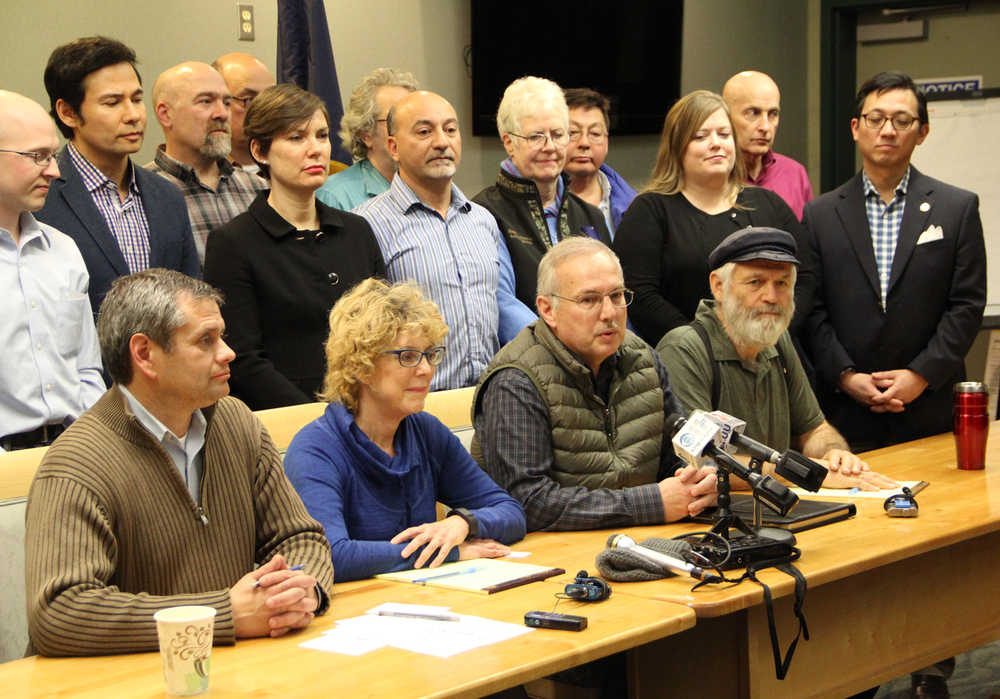The more things change, the more they stay the same.
Alaska still has a bipartisan House Majority caucus, but it will be led by Democrats for at least the next two years.
The new House Majority leadership includes former minority leader and Anchorage Democrat Rep. Chris Tuck as majority leader, Dillingham Democrat Rep. Bryce Edgmon as House Speaker, and Republicans Rep. Paul Seaton, from Homer, as Finance co-chair and Gabrielle LeDoux, of Anchorage, as Rules Committee chair.
Nome Democrat Neal Foster will co-chair the Finance Committee alongside Seaton.
The 22-member majority also includes Rep. Louise Stutes, R-Kodiak, Alaska’s new House Majority whip.
“I think we are what Alaskans want to see,” Tuck said during a Wednesday afternoon news conference to announce the new group.
The Democrat-led caucus differs from the previous bipartisan House Majority because it has bipartisan leadership, Tuck said.
Members of the caucus said repeatedly during the gathering that they formed with the sole purpose of closing the state’s $3 billion-plus budget deficit with a comprehensive package of budget cuts, reforms and new revenues — a message similar to that echoed by Gov. Bill Walker since unveiling his fiscal plan of cuts, taxes and Permanent Fund earnings revenue a little less than a year ago.
“The severe drop in oil revenues, coupled with legislative inaction, has contributed to the current recession that threatens our economy, the livelihoods of thousands of Alaskans and essential services like education and public safety. The members of the new House Majority are dedicated to passing a legislative agenda that addresses the fiscal crisis and the root causes of the crisis,” Edgmon said.
He added that one of the primary goals will also be moving the state away from near total dependence on oil-based revenues to give Alaska a strong and long-term fiscal foundation.
Edgmon had previously caucused with the former Republican House Majority, a strategic move made by other rural Democrat legislators to secure better committee positions and funding for projects in their communities.
Seaton said a percent-of-market-value draw on the earnings of the Permanent Fund, much like the proposal that passed the Senate but died in the House last session, and a broad-based tax would almost certainly be part of the majority’s fiscal plan. Seaton has introduced both income tax and a combined Permanent Fund restructuring-income tax bills in recent years to try and resolve the state’s budget problems. His legislation gained little traction in the Republican majority, however.
Using the Permanent Fund partially to fund government was a notion that numerous House Democrats opposed last year because it almost assuredly means smaller dividend checks in the future. Seaton reiterated the notion championed by Walker and others who supported his Fund legislation that balancing the budget is the only way to assure any PFD payments long-term.
Seaton added that any tax proposals will not be “putting taxes in place so we can spend more,” but rather adding revenue streams to avoid the severe budget cuts called for by some House Republicans.
The Republican Majority under outgoing Speaker Rep. Mike Chenault fractured last year over oil and gas tax credits with a group of dissenters led by Seaton who called themselves the “Musk Ox” caucus, leading to speculation that a new majority could form in this Legislature.
Tuck said lessening the industry subsidies will again be an issue for the coalition, but the group also wants to encourage competition on the North Slope among producers.
Alaska Republican Party Chairman Tuckerman Babcock did not take kindly to the turnabout, calling LeDoux, Seaton and Stutes “deceitful” in a letter directed at the three and released following the announcement:
“You won your elections running as Republicans in your respective districts. That was an illusion, a false picture you presented to the voters of your districts,” Babcock wrote. “Because of your recent actions abandoning your team and joining with the House Democrats, we invite you to drop the pretense that you are Republican and leave the Republican Party.”
Tuesday night’s election results increased the number of Democrats in the House, but still left the party with a 17-member minority in the 40-seat House, plus Ketchikan independent Rep. Dan Ortiz, who caucused with the Democrat-led minority in the previous Legislature.
With incoming Anchorage freshman House member Jason Grenn, who defeated Republican Rep. Liz Vazquez, and the group of Republicans, the Democrats were able to pull together their own majority less than a day after the election results were apparent.
The Alaska Senate will look much the same as it has for several years, but it will be led by Fairbanks Republican Sen. Pete Kelly as the state’s new Senate president, taking over for Anchorage Republican Sen. Kevin Meyer. Meyer is now chair of the Senate Rules Committee. Sen. Peter Micciche of Soldotna will be majority leader.
Sen. Anna MacKinnon, R-Eagle River, will remain as a Finance co-chair along with new Finance co-chair Sen. Lyman Hoffman, D-Bethel.
Golovin Democrat Sen. Donny Olson also returned to the minority following a brief stint with the Republican majority last session. Still, the Republican-led Senate coalition holds a super-majority with 15 members in the 20-seat body.

